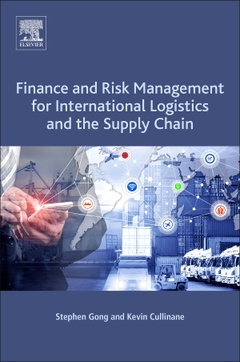Description
Finance and Risk Management for International Logistics and the Supply Chain
Coordinators: Gong Stephen, Cullinane Kevin
Language: English
Keywords
Accounting; Agricultural cooperatives; Aircraft size; Airline industry; Autonomous ships; BSEC region; Boom and bust cycles; Capacity management; Capital structure risk; Causality; China; Cold chains; Collaboration; Commodities; Contagion; Copulas; Corporate finance; Credit crisis; Cross-border operations; Deep-tier supply chains; Disclosure; Disruption; Dry bulk earnings; Export credit agencies; Finance history; Finance perspective; Financial guarantees; Financial instruments; Financial management; Flight frequency; Food supply; Free economic zone; GARCH conditional volatility; Hedging; IPO; Impulse responses; Intermodal; Investment analysis; Investments; Investor sentiment; KG model; LNG-fueled ships; Leasing; Legal perspective; Load factor; Logistics service perspective; Logistics service providers; Long-term finance; MLP; Model Law; New technology ships; Operations and finances; Payment scheme; Quality provision; Real estate; Regional economic development; Risk; Risk assessment; Risk management; Risk modeling; Ship finance; Shipping; Short-term finance; South Korea; Supplier risk; Supply chain; Supply chain finance; Supply chain integration; Supply-chain risk; Tail risk; Trade finance; Transaction cost economics; Transport risks; Trust; Value-at-risk; Value-chain analysis
342 p. · 15x22.8 cm · Paperback
Description
/li>Contents
/li>Readership
/li>Biography
/li>Comment
/li>
Finance and Risk Management for International Logistics and the Supply Chain presents a detailed overview of financial and risk management tools, activity-based costing, and multi-criteria decision-making, providing comprehensive guidance for those researching and working in logistics and supply chain management. The book breaks new ground, combining the expertise of leading authorities to analyze and navigate the funding components for these critical transportation functions. As the international logistics and supply chain transportation fields have recently received heavy investments, this research and the theory behind it provide a timely update on risk management, finance and legal and environmental impacts.
Users will find sections that address the wide-ranging issues related to this emerging field that are presented from an international and holistic perspective.
2. Supply Chain Finance and Risk Management: A Selective Survey and Research Agenda
3. Different Perspectives on Supply Chain Finance—In Search of a Holistic Approach
4. Modeling Risks in Supply Chains
5. The Evolution of Modern Ship Finance
6. Investor Sentiment, Earnings Growth, and Volatility: Strategies for Finance in International Shipping
7. Tail Risks in Credit, Commodity, and Shipping Markets
8. Financing Ships of Innovative Technology
9. Operational and Financial Management in Agricultural Cooperatives
10.Cold-Chain Systems in China and Value-Chain Analysis
11.Choosing Cross-Border Financial Guarantee Instruments— Economic Implications and Hidden Risks
12.Regional Effects of Port Free Economic Zones on Real Estate Speculation: A Korean Case Study
13.Risk Management in the Airline Industry
1 – Transportation researchers involved in planning, modeling, and economics, and senior undergraduate and graduate students enrolled in transportation programs; 2 - Practitioners, analysts, venture capitalists, and consultants employed in private sector transportation interests, such as freight companies, airlines, and equipment manufacturers 3 - Government entities, such as state and federal departments of transportation.
Kevin Cullinane is a Professor of International Logistics and Transport Economics at Gothenburg University (Sweden). He has been an adviser to the World Bank and governments of Scotland, Ireland, Hong Kong, Egypt, Chile and the U.K. He holds an Honorary Professorship at Hong Kong University and numerous Visiting Professorships, including at the Swedish National Road and Transport Research Institute. He has been published in 10 books and more than 200 journal articles, and is an Associate Editor of Elsevier’s Transportation Research A: Policy and Practice, and Transportation Research Part D: Transport and Environment journals.
- Provides a valuable reference covering the full slate of financial issues of interest to global players in the international transport, logistics and supply chain industries
- Covers a truly international perspective, addressing a diverse variety of worldwide transport, logistics and supply chain contexts
- Features finance and risk-management strategies related to the banking industry, exchange rates, fuel prices, climate-related funding, freight derivatives and legal aspects




